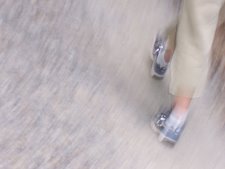
(part one in a Thanksgiving saga)
November in the south is a mix of summer and winter, the reason that so many southerners catch cold. We layer our clothing in the morning and peel it off in the afternoon. A cold front can blow in a dusting of snow atop freshly planted pansies that melts away by dinner. That first Thanksgiving without our daughter Jessi, November was stuck in that weird gear between autumn and winter. A gray mist hung in the neighborhood along with the rumors that continued to circulate about the fallen Twin Towers of New York.
Jared, our youngest, stood in the landing of our circular staircase, pensive, wanting me to come downstairs but unsure of how to say it. “Come see to Dad.” He said and ran downstairs.
My husband Randy was a tent maker, meaning that he was working odd jobs while starting a new church. He delivered fireworks, he measured houses for carpet, he watered plants at the home improvement store.
“Mom, Josh is carrying Dad in the house. He forgot to make our reservations.”
Jared’s voice sounded troubled. He was always the non-emotional child, so to hear worry tainting his matter-of-fact tone brought me to my feet.
“Why would Josh carry Dad?” I asked, following Jared down the circular staircase.
Josh burst through the front door, Randy’s arm around his neck. Josh’s arms were wrapped around his dad and he was hefting him along.
Randy was working a second job to make extra money; church planters call it “tent making” after the Apostle Paul. He was delivering fireworks to various vendors around town. He had pulled off the interstate on the side of the road overcome with grief. Disillusionment sucked all life out of him. By the time he pulled up in our driveway, his fingers were frozen to the steering wheel. Josh looked out and saw his dad sitting frozen in the driver’s seat of his truck. He ran out of the house and pried his fingers from the steering wheel before hoisting him out of the truck.
Randy’s face was haggard. His eyes were half-mast. He kept apologizing. “I didn’t make the reservations. I knew I was supposed to.” He kept saying, “ I’m sorry,” to the boys.
“We’ll do something else,” I said, as if I could think and plan.
I made a few phone calls to restaurants. The first three I called closed for Thanksgiving. It was no matter, I thought. Plenty of restaurants would offer a Thanksgiving buffet. I would call in the morning after some rest. I went to bed, racing the elephant of holiday grief to dreamland.
Josh awakened me the next morning. “I’ve called a dozen restaurants in Charlotte. None of them answered the phone.”
“The staffs are busy. It’s early,” I said. I threw on my robe and joined Josh, making calls on another line. We called until noon without reaching a single restaurant.
Thanksgiving is important to restaurants, I thought. We would have no trouble finding a place to eat. “It’s ridiculous to worry, Josh.”
It is considered in modern culture wrong to disappoint our children. We forget how disappointed pioneers often had to sit down with their children and tell them, “I didn’t get that bear today. It’s gopher meat again.” But by noon, the guilt that accompanied the disappointed look in both boys’ eyes moved in and sat down on me, squashing me like a too-small sofa.
As I crossed the threshold of that first Thanksgiving without my daughter, I learned the practice of counting the disappointments. I counted them at first as personal failures as a mother.
Josh hung up the phone again and said, “Not a single restaurant is open in the entire county.” Irritation was spilling out of him.
“We’ll go to the grocers. Let’s make a list,” I said.
The pain chafed against me as Josh and I bundled for the brisk gray day and went out into the city in search of an open store.
(To be continued. . .)
Jared, our youngest, stood in the landing of our circular staircase, pensive, wanting me to come downstairs but unsure of how to say it. “Come see to Dad.” He said and ran downstairs.
My husband Randy was a tent maker, meaning that he was working odd jobs while starting a new church. He delivered fireworks, he measured houses for carpet, he watered plants at the home improvement store.
“Mom, Josh is carrying Dad in the house. He forgot to make our reservations.”
Jared’s voice sounded troubled. He was always the non-emotional child, so to hear worry tainting his matter-of-fact tone brought me to my feet.
“Why would Josh carry Dad?” I asked, following Jared down the circular staircase.
Josh burst through the front door, Randy’s arm around his neck. Josh’s arms were wrapped around his dad and he was hefting him along.
Randy was working a second job to make extra money; church planters call it “tent making” after the Apostle Paul. He was delivering fireworks to various vendors around town. He had pulled off the interstate on the side of the road overcome with grief. Disillusionment sucked all life out of him. By the time he pulled up in our driveway, his fingers were frozen to the steering wheel. Josh looked out and saw his dad sitting frozen in the driver’s seat of his truck. He ran out of the house and pried his fingers from the steering wheel before hoisting him out of the truck.
Randy’s face was haggard. His eyes were half-mast. He kept apologizing. “I didn’t make the reservations. I knew I was supposed to.” He kept saying, “ I’m sorry,” to the boys.
“We’ll do something else,” I said, as if I could think and plan.
I made a few phone calls to restaurants. The first three I called closed for Thanksgiving. It was no matter, I thought. Plenty of restaurants would offer a Thanksgiving buffet. I would call in the morning after some rest. I went to bed, racing the elephant of holiday grief to dreamland.
Josh awakened me the next morning. “I’ve called a dozen restaurants in Charlotte. None of them answered the phone.”
“The staffs are busy. It’s early,” I said. I threw on my robe and joined Josh, making calls on another line. We called until noon without reaching a single restaurant.
Thanksgiving is important to restaurants, I thought. We would have no trouble finding a place to eat. “It’s ridiculous to worry, Josh.”
It is considered in modern culture wrong to disappoint our children. We forget how disappointed pioneers often had to sit down with their children and tell them, “I didn’t get that bear today. It’s gopher meat again.” But by noon, the guilt that accompanied the disappointed look in both boys’ eyes moved in and sat down on me, squashing me like a too-small sofa.
As I crossed the threshold of that first Thanksgiving without my daughter, I learned the practice of counting the disappointments. I counted them at first as personal failures as a mother.
Josh hung up the phone again and said, “Not a single restaurant is open in the entire county.” Irritation was spilling out of him.
“We’ll go to the grocers. Let’s make a list,” I said.
The pain chafed against me as Josh and I bundled for the brisk gray day and went out into the city in search of an open store.
(To be continued. . .)








